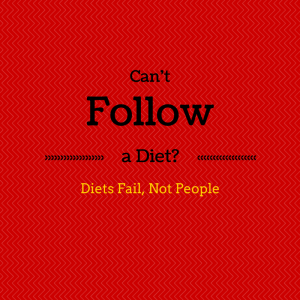 Whether you are a chronic dieter or a newbie at dieting—you know diets are tough to “stay on”.
Whether you are a chronic dieter or a newbie at dieting—you know diets are tough to “stay on”.
Lack of willpower or personal shortcoming is often sighted as the reason people can’t follow a diet. I believe that lack of willpower is not the reason for diet failure, but the diet itself. There is little to no evidence that shows dieting works to reduce body weight (and keep it off) in large sample sizes of people. Most studies indicate that dieting works for a while, but isn’t a long-term solution.
If you have been on several diets this may sound familiar: You are able to follow a diet for a few weeks or months, then you get side-tracked and go “off” the diet and then re-gain lost weight.
There are so many bad things about dieting, beside dieting’s ineffectiveness, I don’t know where to begin. But, here are just a few of my gripes about dieting:
First, most diets totally disregard our natural hunger/fullness cues. We need to become more attuned eaters (Listen to our bodies’ hunger and fullness cues.) to help us find our healthy weight, not ignore them by following some diet. For example, when the diet has “ended” dieters have reduced their ability to respond to hunger/fullness cues which may result in the regain of lost weight.
Second, diets often reinforce “all-or-nothing” thinking. All-or-nothing thinking, also known as “black and white” thinking, assumes that everything is in absolutes. One example of an all-or-nothing thought is “I am either on a diet or eating horribly”. There is hardly anything in our world that is an absolute (Including eating–For example, isn’t normal eating sometimes eating foods that aren’t very nutritious? ). If we are able to think in shades of gray about food and weight that may help get us unstuck from the dieting roller coaster.
Third, dieting is a known risk-factor for developing an eating disorder. Dieting is a “modifiable” risk factor in developing an eating disorder. Of course, not all dieters develop an eating disorder, but it does increase your risk for one.
Fourth, dieting can promote weight cycling and for some cause more weight gain. Yo-yo and chronic dieting often promotes this roller coaster of weight gain/loss. Sometimes dieters end up re-gaining more weight than they lost. Scientists are just beginning to understand how weight cycling affects our health. For example Dr. Strohacker and colleagues discuss in their professional review “Influence of obesity, physical inactivity, and weight cycling on chronic inflammation” that weight cycling produces an inflammatory response that is associated with the origins of Type 2 diabetes and cardiovascular disease. They postulate that the inflammatory response from weight cycling may be more damaging than the inflammatory response of obesity.
Fifth, dieting increases preoccupation with food and weight. Preoccupation with food (thinking about food at lot, planning out meals, etc.) has been shown to increase when the body goes into caloric deprivation. In “The Great Starvation Experiement” conducted by Dr. Ancel Keyes in the mid-nineteenth century who studied the effects of semi-starvation in humans. As part of the experiment the group of 36 men went from consuming 3,200 calories per day to an abrupt 1,570 calories per day (Sounds like dieting doesn’t it?). A marked increase in food obsession (thinking, fantasizing, talking, etc. about food) among participants was noted. Food and weight preoccupation can be exhausting, interfere with daily living, can leave one feeling riddled with guilt and shame and frankly can drive one a little batty.
I believe the first step to healthy eating is actually to give-up dieting. And begin to tune into our bodies natural hunger and fullness cues. To learn more about non-dieting approach to eating and health please visit Health at Every Size and Intuitive Eating.